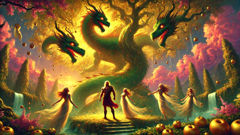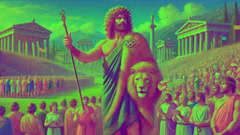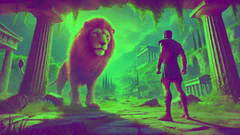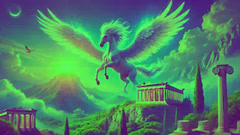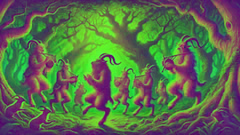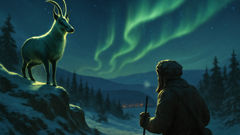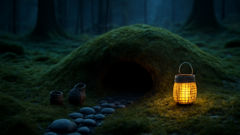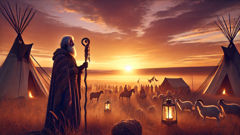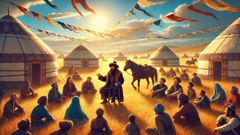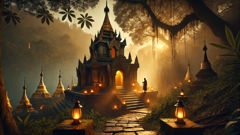Introduction
To wander into the legends of ancient Greece is to journey beyond the reach of time, where gods walked among mortals and heroes chased destinies painted across the vault of heaven. Among these tales, none shimmer brighter or test the spirit more keenly than the story of Heracles’ eleventh labor: the quest for the golden apples of the Hesperides. These apples were not mere fruit, but living emblems of immortality, growing on branches woven by Gaia herself and hidden at the world's edge. Their radiance rivaled the sun’s and their scent was said to lull even the fiercest beasts into peaceful slumber. Yet, these treasures were jealously guarded—watched over by the Hesperides, nymphs whose laughter masked secrets, and protected by Ladon, a monstrous serpent with a hundred unblinking eyes. Heracles, renowned for his strength yet weary from ten impossible tasks, now faced a challenge that would require not just brawn, but the sharpness of mind and the favor of gods. His journey would span continents and cross into the land of myth itself. The path was littered with trials: mountains cloaked in perpetual twilight, riddles posed by immortal beings, and monsters whose very names sent chills through the hearts of mortals. Yet, it was not just the obstacles ahead that weighed on Heracles—it was the knowledge that this labor was a test not merely of muscle, but of his place in the order of things, his relationship to fate and the gods who had marked his life with glory and suffering. In this story, we trace Heracles’ footsteps from the bustling palaces of Tiryns to the shadowy edges of the world, through encounters with Prometheus and Atlas, and finally to the golden gates of the garden itself. There, with every choice and every act, Heracles would forge a legend that would echo through centuries, inspiring awe and reflection on the price of immortality, the power of cunning, and the unyielding courage required to face the unknown.
The Road West: Seeking the World’s Edge
King Eurystheus’ command to fetch the golden apples seemed, at first, like a final jest—one last impossible hurdle to break Heracles’ spirit. The hero’s ten labors already echoed throughout Greece: he had faced the Nemean Lion’s invulnerable hide, cleansed Augeas’ stables in a single day, and snatched the girdle from Hippolyta, queen of the Amazons. Yet nothing in his storied past quite matched the uncertainty of a quest whose destination was shrouded in both distance and secrecy. The garden of the Hesperides was spoken of only in riddles. Some said it lay past the Pillars of Heracles, where the world dissolved into Oceanus’ endless embrace. Others whispered it floated on an island ringed with mists, guarded by the daughters of night and a serpent that never slept.
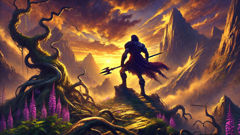
Heracles began by seeking wisdom. He journeyed to the Oracle at Delphi, offering sacrifices and enduring days of fasting before the Pythia’s trance. Her voice, thick with prophecy, urged him westward. “Beyond where Atlas holds up the sky, where day surrenders to night, the apples hang—yet not for mortal hands.” Armed with a direction but little more, Heracles set out from Tiryns, his lion’s skin draped across his shoulders and his club in hand. Along the road, he crossed through lands marked by hardship and beauty: vineyards climbing sunbaked hills, rivers that sparkled under Helios’ watchful gaze, forests where dryads whispered secrets to the wind.
In the land of King Augeas—whose stables Heracles had cleansed—he was offered food and rest. The king, grateful but wary of provoking Hera’s wrath, gave little counsel. Farther west, in the lands of Elis and Arcadia, peasants gossiped of the garden’s marvels. “The apples grant youth anew,” said one crone, her eyes clouded with age, “but their taste dooms mortal flesh.” Heracles listened, weighing stories against his sense of purpose. He pressed onward, traversing rocky passes and crossing paths with centaurs who eyed him warily but dared not provoke his legendary strength.
As he neared the edge of the known world, the landscape grew strange. The air thickened with the scent of unseen blossoms. Trees twisted into impossible shapes, their roots drinking from streams that shimmered silver beneath the moon. In the village of Erytheia, ancient as memory, Heracles finally found a clue. A shepherd—gnarled as an olive branch—claimed to have glimpsed a strange glow on distant nights. “West, always west,” he murmured. “Past the mountains where the sky dips low, beyond the cave of a Titan’s suffering.”
Heracles’ path now cut through lonely valleys and over mountains that scraped the sky. At dusk, the world turned violet and gold, and Heracles felt the weight of divinity in the air—a subtle trembling, as if nature itself knew he was approaching a threshold. On the slopes of Mount Caucasus, he heard a terrible wailing carried by the wind: the agony of Prometheus, chained by Zeus for gifting fire to mankind. Heracles, drawn by pity and a sense of kinship, tracked the cries to a desolate crag where an eagle tormented the Titan daily. With one mighty throw, Heracles launched his club and struck the eagle from the sky. Prometheus, freed at last, gasped his gratitude and, through tears, whispered the path forward. “Seek Atlas, who bears the heavens. Only he knows the garden’s secret gate.”
With renewed purpose, Heracles pressed on. The landscape faded into wildness—a realm where myth and reality blurred. Shadows lengthened as he passed the last settlements, and every breath tasted of anticipation. At the horizon, the sky itself seemed to rest upon a mountain so vast it defied understanding. Here, Heracles paused. Before him lay the true border of the world, and beyond it, the garden where immortality gleamed upon golden boughs.
Atlas and the Weight of the Heavens
As Heracles ascended the final rise, the world seemed to hush in reverence. The landscape was transformed; boulders glistened with dew that never dried, and ancient trees leaned inward as if to witness the meeting at the world’s spine. It was here that Heracles found Atlas, the Titan condemned to bear the sky upon his shoulders for all eternity. Atlas was enormous—his body rippled with celestial strength, his back hunched beneath a dome of swirling stars and clouds, the heavens themselves pressing down with a force no mortal could imagine. His eyes, deep as forgotten seas, flickered with weariness and wisdom in equal measure.
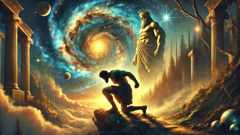
Heracles approached with humility, for even his mighty feats paled before such a burden. He called out, announcing his purpose and the hope that Atlas could lead him to the Hesperides’ garden. Atlas regarded him in silence for a time, measuring the hero with a gaze that pierced flesh and spirit. “You seek the apples of immortality,” Atlas rumbled. “Many have desired them; none have succeeded. My daughters—the Hesperides—guard them with riddles and song, and Ladon coils around the tree’s roots, never sleeping.”
Heracles explained his quest, the demands of Eurystheus, and the promise extracted by Hera’s relentless will. Atlas’ expression shifted—something like amusement flickered across his features. “Perhaps I could aid you,” he mused, “but my hands are not free. If you will shoulder my burden for a time, I shall fetch the apples myself. Only a Titan or one touched by divinity can approach the tree without waking Ladon’s fury.”
The proposition was dangerous but enticing. Heracles, never one to flinch from pain or challenge, agreed. Atlas eased the vault of heaven from his shoulders with ponderous care, guiding it onto Heracles’ broad back. Instantly, Heracles felt a weight unlike any he had borne—an invisible pressure that threatened to crush him into the earth. The stars above seemed sharper, and every breath required iron resolve. Yet he stood firm.
Atlas straightened for the first time in centuries, stretching limbs that ached from endless servitude. He looked almost jubilant as he strode toward the garden’s hidden gate, which shimmered at the edge of sight—a portal draped in golden light and perfumed with the scent of eternal spring. Heracles watched as Atlas disappeared among the trees, dwarfed by their ancient girth. Time passed in a slow, grinding crawl. Heracles’ mind wandered, buffeted by visions of endless sky, the fates weaving their ceaseless threads, and Hera’s watchful eyes glinting with enmity.
At last, Atlas returned. In his massive hand were three golden apples, each one flawless and radiant beyond mortal comprehension. Their glow lit up the gloom, casting shifting patterns on the ground. But Atlas’ mood had changed—he eyed the sky warily and grinned. “Perhaps I should take these apples to Eurystheus myself,” he said slyly. “I am weary of my sentence and your strength is suited for eternity’s yoke.”
Heracles sensed the danger in Atlas’ words. Yet, his mind was as sharp as his body was strong. With feigned nonchalance, he agreed: “A fine plan, but first, relieve me for just a moment while I adjust my lion skin as a cushion. Then you may bear your burden no more.” Atlas, deceived by Heracles’ calm, took back the weight of the sky for a moment. Instantly, Heracles seized the apples and stepped away, bowing in gratitude but refusing to resume Atlas’ punishment. Realizing he had been outwitted, Atlas thundered in frustration, but Heracles’ cleverness had prevailed. Clutching the golden apples, he turned from the Titan, his path now leading toward the garden’s heart—and its most dangerous guardian.
Ladon and the Song of the Hesperides
Heracles walked through a world transformed—each step crackled with possibility and peril. The garden stretched before him in impossible splendor: meadows dotted with narcissus and crocus, streams singing over crystal stones, and everywhere, the scent of honey and immortality. Golden apples glimmered among leaves of darkest green, their allure undeniable. Yet all beauty here was edged with danger.
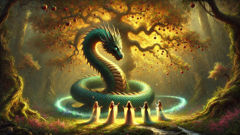
At the heart of this paradise stood the Tree of Life, its branches heavy with fruit that gleamed like captured sunlight. Circling its roots was Ladon: a dragon immense and terrifying, scales shifting in every color of dusk, one hundred eyes gleaming with unblinking vigilance. Ladon’s coils twisted around the trunk and its heads wove in constant motion, making escape or stealth impossible.
Near the tree danced the Hesperides—the daughters of Atlas and night. Their laughter carried on the wind, sweet and perilous. Aegle, Erytheia, and Hesperia spun in a ring of white-gold dresses, singing riddles that confused time and sense. Their beauty was ethereal and their song both enchanting and sorrowful, as if aware that their task kept them forever apart from the world’s joys.
Heracles paused at the edge of the glade, weighing his options. His club would be useless against so many dragon heads. He watched as Ladon’s eyes flickered, never closing all at once. Then, from the shadows, a figure emerged—the Titan Prometheus, who had followed Heracles’ progress out of gratitude. He whispered advice: “Ladon is immortal, but can be lulled by music and story. Trust not only your arms, but your tongue.”
Drawing on his own adventures and sorrows, Heracles began to sing—low at first, then with rising conviction. He sang of distant lands, of battles won and friends lost, of suffering and hope. The Hesperides paused in their dance, their heads tilting as if remembering a home long forgotten. Even Ladon slowed, its heads swaying in rhythm to the hero’s voice. The garden itself seemed to sigh, as if the very air mourned lost innocence.
When Heracles finished, a silence deeper than night settled over the garden. The Hesperides wept quietly, their song momentarily stilled. Ladon’s eyes fluttered in drowsy half-sleep. Seizing the moment, Heracles moved among the roots, careful not to disturb a single coil. With infinite care, he plucked three golden apples—their skin cool and heavy in his hands.
As he withdrew, Ladon stirred but did not attack. The Hesperides offered him a bittersweet smile—a silent blessing or a warning lost to time. Heracles stepped beyond the threshold, carrying both the apples and the memory of a paradise guarded by sorrow and song.
Conclusion
With the apples secured and the garden fading behind him, Heracles retraced his steps through lands forever altered by his passing. Atlas watched from afar, his shoulders once again bowed beneath the heavens, while Prometheus’ chains lay shattered on distant rocks. At every crossroads, Heracles felt the presence of gods—some approving, some resentful. When he finally reached Tiryns, the air trembled with anticipation. Eurystheus, always eager to see Heracles fail, gazed in disbelief at the flawless golden apples.
Yet even in victory, there was no simple triumph. The gods decreed that such treasures belonged not to mortals but to immortals alone. Athena herself descended in a flash of wisdom and power to return the apples to their sacred tree. Heracles’ labor had proven not his right to immortality, but his ability to brave the impossible with wit, humility, and strength. The journey had tested him in ways no battle could: it demanded trust in others—Prometheus’ advice, Atlas’ bargain—and compassion for those bound by fate.
The legend of Heracles and the Apples of the Hesperides lives on, not merely as a tale of monsters and miracles, but as a reminder that true courage lies in facing what cannot be conquered, acting with cunning when force will not serve, and knowing when to accept that some treasures are best left untouched.

